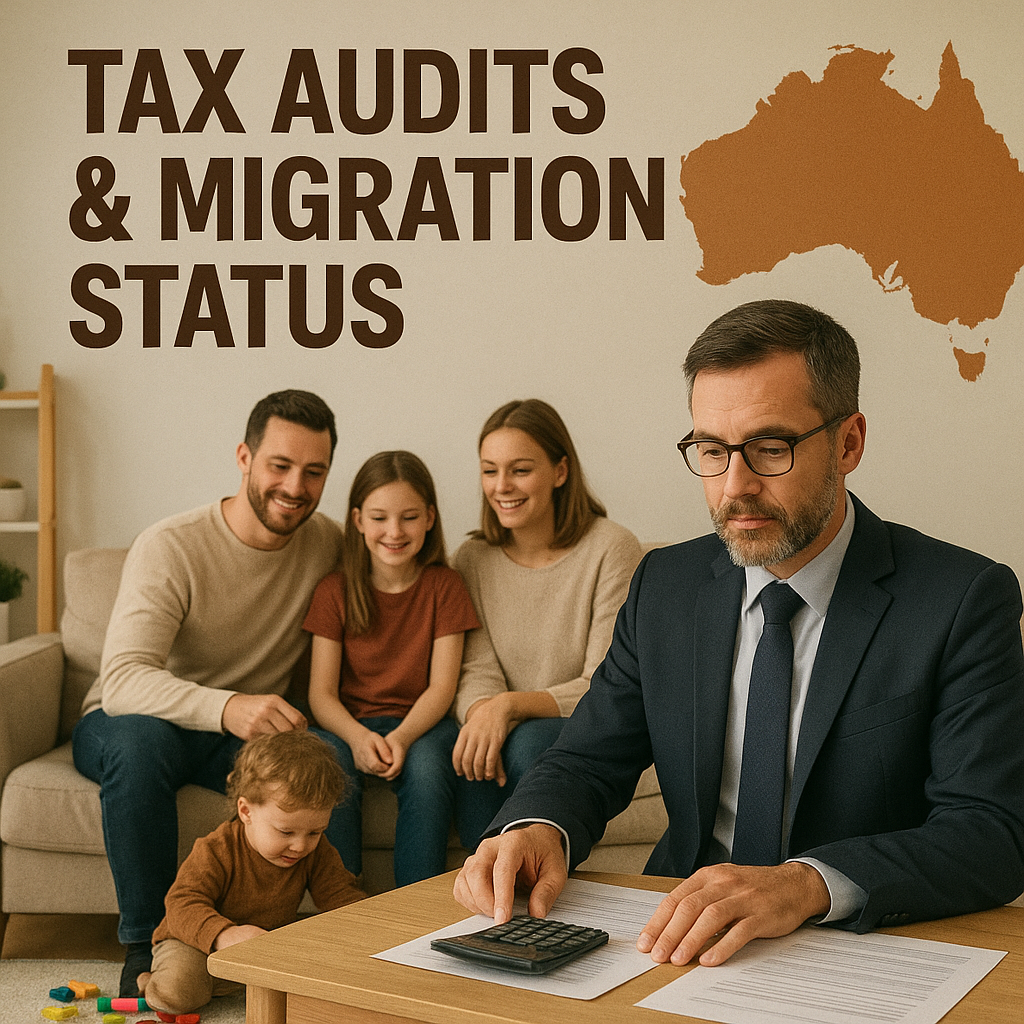Explore how tax audits impact migration status, understand tax compliance for skilled migrants, and discover essential tips to protect your visa from audit risks.
Introduction
For skilled migrants, tax obligations do not merely affect their financial standing; they also intertwine intricately with their migration status. Tax audits — investigations conducted by tax authorities to verify compliance — have grown increasingly sophisticated, especially under international information-sharing agreements. According to a 2023 OECD report, cross-border tax audits among migrants increased by over 30% in the past decade. This trend underlines the importance of understanding the relationship between tax audits and migration status. Failure to meet tax obligations can jeopardize visa applications, renewals, and even lead to adverse immigration consequences. This in-depth guide unpacks the complexities of tax audits in the context of migration, explaining compliance requirements, risks, and practical strategies for visa holders.
How Tax Audits Intersect with Migration Status
Tax audits are formal reviews initiated by government tax authorities to confirm whether individuals or entities have correctly reported income, paid the appropriate taxes, and complied with prevailing tax laws. For migrants, audits often become more complex due to their international financial activities and residency status ambiguities.
Why Tax Audits Matter for Migrants
Many skilled migrants:
- Have income streams from multiple countries.
- Navigate changing tax residency statuses.
- Are subject to different tax regulations in host vs. home countries.
Tax authorities globally exchange information under treaties such as the Common Reporting Standard (CRS), enabling coordinated audits across borders. Audit findings indicating tax evasion, non-disclosure of income, or underpayment can trigger migration-related consequences such as:
- Visa cancellations.
- Application refusals.
- Revocation of work permits.
- Negative character or compliance assessments.
For example, Australian immigration policies require full disclosure of tax compliance history during visa assessments. They may refuse or cancel a visa if significant tax offenses or unpaid debts surface during audits.
Tax Residency: The Foundation of Your Tax Obligations
A taxpayer’s residency status largely determines the scope of their tax liability. Residency tests vary by country but generally classify individuals as:
- Resident taxpayers, liable to pay tax on worldwide income.
- Non-resident taxpayers, liable only on income sourced in the host country.
Migrants often toggle between these statuses during their stay abroad. Misclassification, whether intentional or inadvertent, risks audit scrutiny and resultant penalties.
Residency Tests and Their Migration Implications
- Australia: Residency is assessed based on physical presence, intention, and residential ties. Residents file tax returns on global income, non-residents only on Australian source income.
- USA: Residency hinges on the Substantial Presence Test or Green Card status, impacting tax filing obligations.
- UK: Complex statutory residency rules govern tax liability.
Understanding these nuances is vital for skilled migrants to avoid accidental non-compliance and audit triggers.
Tax Compliance Obligations for Skilled Migrants
Income Reporting and Documentation
Migrants must declare all taxable income, including:
- Employment income (local and overseas).
- Investment income such as dividends or rental earnings.
- Foreign bank accounts and assets, where reporting laws apply.
Failing to declare foreign income is a leading cause of tax audits globally.
Filing Timeliness and Accuracy
Timely submission of tax returns with truthful information is critical. Errors, omissions, or suspicious transactions (sudden income spikes, offshore transfers) can stimulate audit flags.
Employer Responsibilities Toward Migrant Workers
Employers hiring skilled migrants must comply with tax withholding, timely reporting, and comply with visa-specific employment conditions. Migrants should review pay slips, tax statements, and superannuation or social security contributions regularly.
Risks Arising from Tax Audits for Migrants
Impact on Visa Status and Renewals
Tax authorities often share audit outcomes with immigration departments. Problems found during a tax audit — such as unpaid taxes, fraudulent claims, or evasion — may reflect poorly on a visa holder’s character or compliance, causing visa refusals or cancellations.
Character Assessments and Financial Integrity
Tax-related matters factor into good character assessments, a key immigration criterion in many countries like Australia and Canada. Serious tax offenses or failure to resolve tax debts can negatively impact these assessments.
Criminal Investigation and Deportation
In extreme cases, detected tax fraud may lead to criminal charges, prosecution, or penalties affecting visa eligibility and possibly resulting in deportation.
Cross-Border Tax Audits
Migrants face growing scrutiny via cross-border audits facilitated by treaties and intergovernmental cooperation.
- Automatic Exchange of Information (AEOI): Countries collect and exchange financial data to detect undeclared assets.
- Double Taxation Agreements (DTAs): Facilitate cooperation but require consistent compliance across jurisdictions.
- Data matching of tax returns with immigration records enhances detection of discrepancies.
Cross-border audits require migrants to maintain extensive, organized documentation and proactively address any inquiries to avoid adverse impacts on migration status.
Strategies for Skilled Migrants to Manage Tax Audits and Protect Migration Status
- Maintain Full Compliance
Always file complete, accurate tax returns on time reflecting all income sources.
- Clarify Your Tax Residency
Consult tax advisors early to correctly determine residency status and filing obligations, avoiding unintentional non-compliance.
- Keep Comprehensive Records
Retain contracts, pay slips, bank statements, foreign income documentation, and correspondence with tax authorities.
- Understand Tax and Migration Interplay
Education about how tax non-compliance may affect visa conditions, extensions, or citizenship applications is crucial.
- Respond Promptly to Audit Notices
Cooperate transparently with tax authorities. Consider voluntary disclosure programs to mitigate penalties and protect visas.
- Seek Dual Expertise
Engage professionals experienced in tax and migration law to navigate complex cases seamlessly.
Employer and Sponsor Responsibilities
Employers hiring skilled migrants must ensure payroll and tax withholding compliance and provide accurate tax-related documentation. Failure to meet these responsibilities can indirectly jeopardize the migrant’s visa standing and employment conditions.
Conclusion
Tax audits and migration status are inextricably linked in an increasingly globalized world. Skilled migrants who proactively understand and manage their tax obligations protect not only their finances but their legal ability to remain and work abroad. Respecting tax laws, maintaining transparency, and seeking expert guidance underpin successful visa journeys. For skilled migrants, tax compliance is not just fiscal responsibility—it is a vital pillar supporting their immigration status and future prospects.


